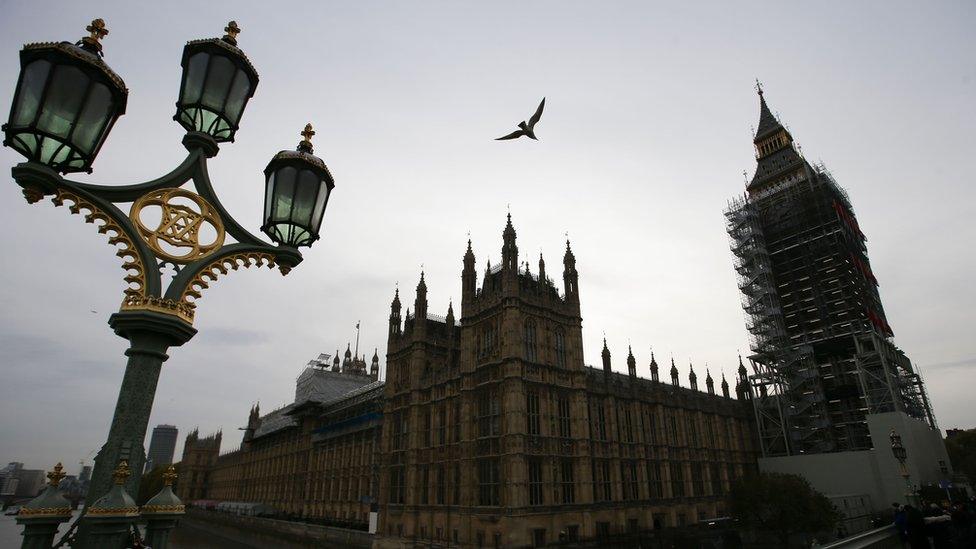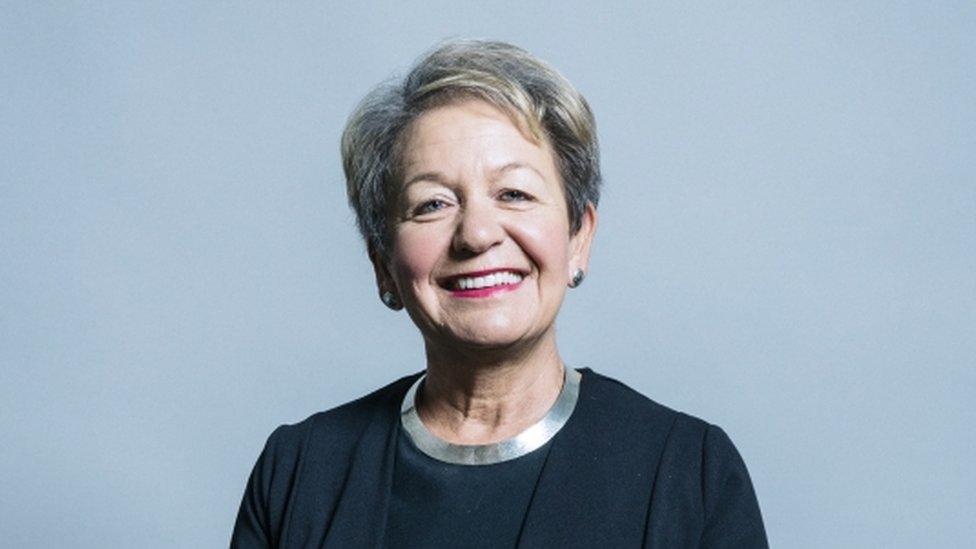How can parliamentary bullying be fixed?
- Published

MPs should not be allowed to sit in judgment on other MPs. That is the key view we have heard from clerks inside the House of Commons, as parliament starts to consider how to stamp out bullying and harassment by our legislators.
This might require major overhauls in Westminster. At the moment, MPs who bully or harass clerks, the apolitical staff who run the House of Commons, can only be sanctioned by the Standards Committee - half of which are MPs.
But a complaints procedure where investigations and sanctions are decided without the involvement of MPs is the bare minimum of what clerks now consider acceptable.
A serving clerk, whom we have referred to as Woman M in our reports, told us: "Members should have no role whatsoever in judging alleged misdemeanours of their colleagues."
"After all, nobody in their right mind would make the friends, colleagues and business relations of the defendant sit in judgment in an employment tribunal? So why should the rules be different here?"
But there are broader problems, too. Clerks need to be confident that complaining will not damage their career prospects. That means MPs cannot make personnel decisions more broadly.
Woman M told us: "The only way to make things better is to separate roles and responsibilities so that Members - including the Speaker - have no role in the appointment and promotion of staff of the House at any level."
Can the fate of MPs be left to politicians?
The case of Paul Farrelly, Labour MP for Newcastle-under-Lyme, is cited by clerks who are sceptical about whether MPs can be relied on to act on allegations of bullying and harassment.
Mr Farrelly was the subject of a formal inquiry in 2012, in relation to allegations of bullying Emily Commander, the clerk of the Culture, Media and Sport committee. She was unable to stay in her post - an outcome she attributed to Mr Farrelly's behaviour. Mr Farrelly denies bullying her.

Paul Farrelly is the Member of Parliament for Newcastle-under-Lyme
But this was not the only time concerns were raised about Mr Farrelly's conduct:
In 2005, a complaint was raised by a senior clerk with a former Labour chief whip, in relation to allegations of bullying of Ms Commander. While the MP to whom they took the complaint was not then a whip, it was understood at the time and subsequently that this person had taken up the issue with the party whips.
At around the beginning of 2009, a complaint was raised with John Whittingdale, chair of the Culture, Media and Sport committee, in relation to allegations of bullying of a CMS committee clerk, Woman N.
In 2009, a complaint was raised with Mr Whittingdale in relation to allegations of bullying of a second CMS committee clerk, Woman H.
In December 2009, Mr Whittingdale asked Mr Farrelly to apologise to Woman H about his conduct during one particular meeting. Mr Farrelly apologised by email.
In 2011, a complaint was raised with Mr Whittingdale in relation to the bullying of a third committee clerk, Ms Commander. This was prior to the formal inquiry into her case.
In 2011, a complaint was raised with the Labour whips in relation to Mr Farrelly's behaviour in relation to Ms Commander.
Some committee chairs have a good reputation for protecting clerks. But Newsnight has heard criticism of Mr Whittingdale's chairing of the Culture, Media and Sport committee, of which his perceived failure to protect clerks was a key part.
Mr Whittingdale told the 2012 inquiry into Mr Farrelly's behaviour that he did not believe that Mr Farrelly had bullied Ms Commander, blaming the stress of the inquiry for her stress.
However, in testimony to the inquiry that he believed would be anonymous, Mr Whittingdale added that Mr Farrelly "does have a tendency to bully. His manner is like that…" When asked to clarify, he added: "He can be very impatient, very sharp in his comments. He doesn't like people to tell him he can't do what he wants. He gives some quite rude responses. I can see it is different to speak that way to a colleague than to a staff member who can't answer back, and he shouldn't do it. He's not blameless."
Mr Whittingdale has been contacted for comment.

John Whittingdale was chair of the Culture, Media and Sport committee
The party machines
Current and former clerks have also been critical of the whips. Concerns about Dame Rosie Winterton have been raised with Newsnight. Dame Rosie was the Labour chief whip who received the complaint against Mr Farrelly in 2011.
She is now a member of the House of Commons' governing body - the House of Commons Commission. Next Monday, she will be one of the MPs who will decide on the remit of the House inquiry into bullying. It is not clear whether, for example, the role of whips will be investigated, and whether individual cases - such as that of Mr Farrelly - will be examined. That would entail checking her own decisions.
Dame Rosie has declined to comment.

Dame Rosie Winterton is a member of the House of Commons Commission
Clerks have also expressed surprise that the Labour party has declined to act on the testimony relating to Mr Farrelly that was reported last week by Newsnight. The party's response has been to note that there has been no formal complaint to them, and that the complaint against Mr Farrelly from 2012 - from which much of the testimony was drawn - was not upheld.
But the reason for the complaint not being upheld was that the House's processes were suspended because the legal basis for sanctioning an MP were regarded as lacking, because MPs did not have a right of appeal and because House staff, who might be deemed to be partial, conducted the inquiry.
At an earlier stage in that inquiry, a member of the House staff did overall uphold the complaint against Mr Farrelly. While the report could not prove that Mr Farrelly had intended to be a bully, they concluded his behaviour amounted to "an abuse of power or position, unfair treatment and undermining a competent worker by constant criticism… The conduct was offensive and insulting."
Furthermore, there is an outstanding complaint raised with the Labour party in relation to Mr Farrelly's behaviour in relation to a Labour councillor: Woman O. Her complaint about his "bullying style" has not yet been resolved by the party. Mr Farrelly says her complaint, which was made in December, is "bandwagon-jumping".
Mr Farrelly denies bullying Emily Commander, Woman H, Woman M, Woman O and Woman P - a clerk whose testimony was given to the 2012 inquiry.
Mr Farrelly denies any bullying but also stated "It is, of course, impossible to comment fully on anonymous complaints or documents I have never seen". He says that he is only aware of the complaints relating to Ms Commander in 2012.